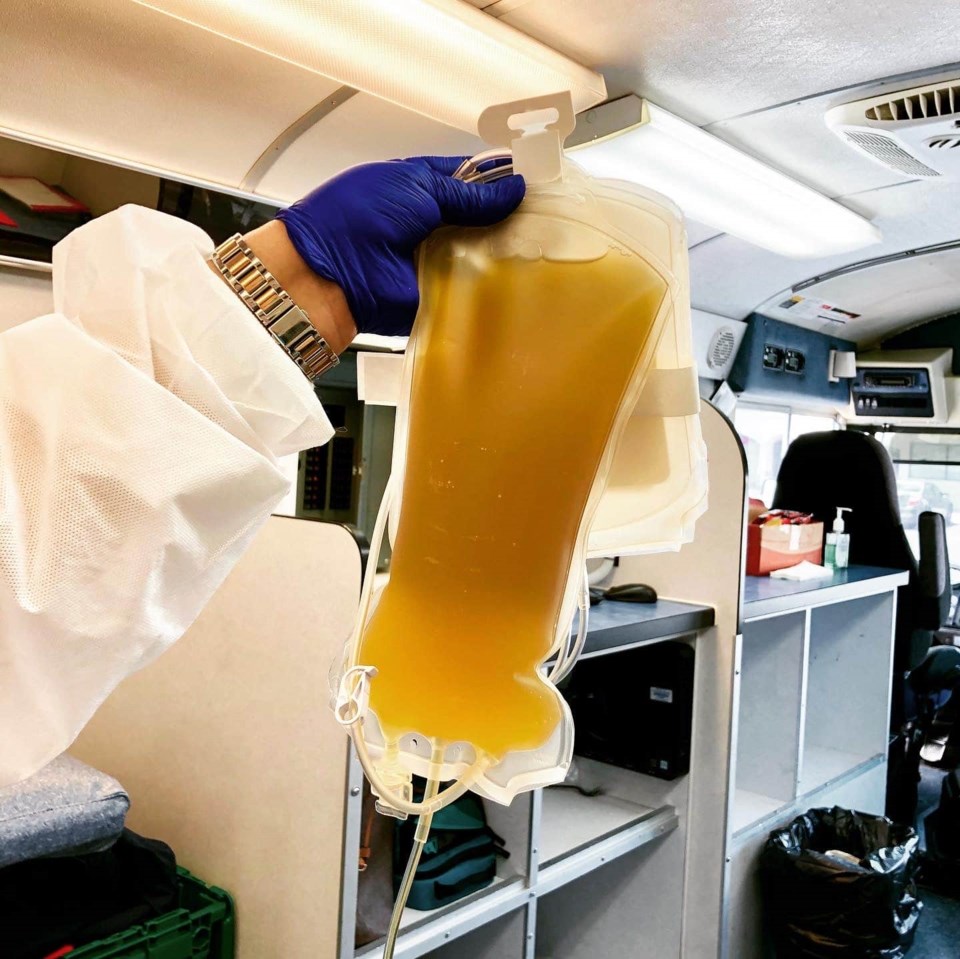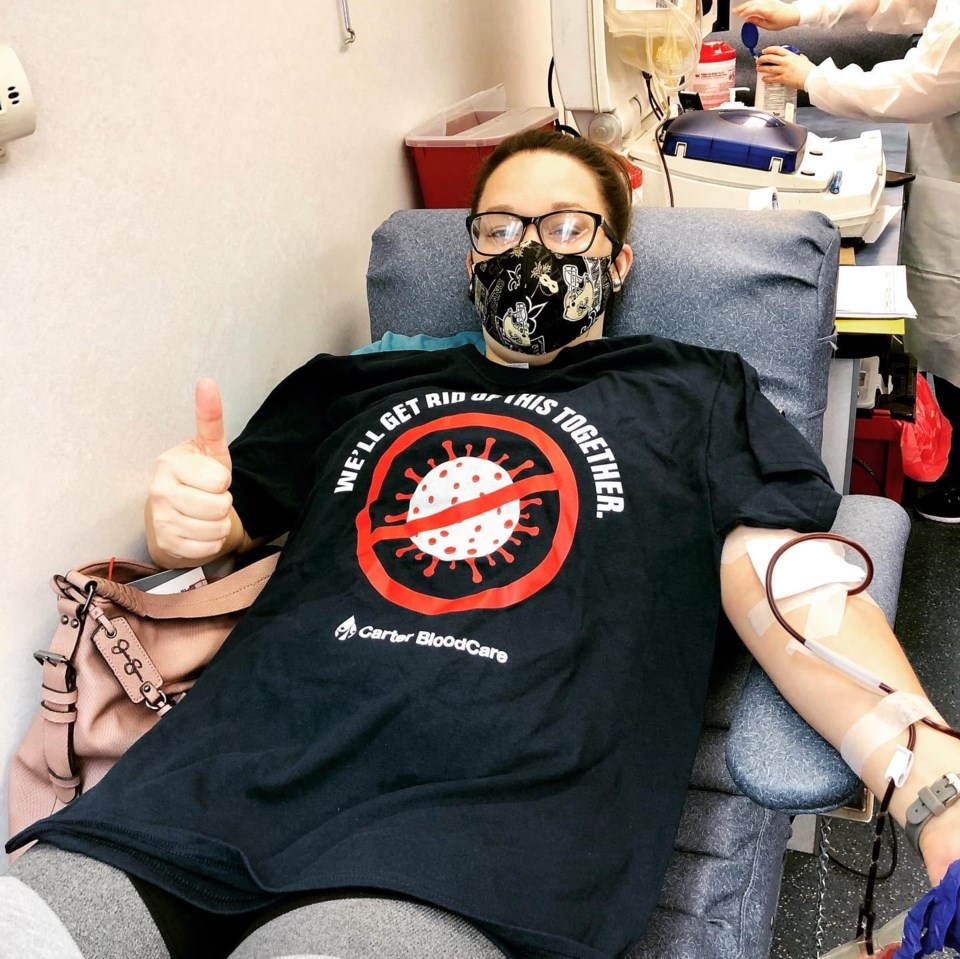Elizabeth Bolt barely felt the needle prick her arm.
Red blood rushed through a maze of tubing leading to a whirring machine that separated and collected a bag of yellow liquid. She squeezed a ball in her hand to help pump her blood back into her body. The whole process took a little over an hour.
The broth-like liquid left behind is precious plasma that is being used in test cases to combat life-threatening cases of COVID-19.
Bolt, a 35-year-old Dallas marketing and communications specialist, read about the need for plasma from recovered coronavirus patients several weeks earlier as she herself was recovering from the virus. COVID-19 wracked her body with a fever, a loss of taste and appetite, diarrhea, and it was difficult to breathe.
“Donating plasma is my way of turning a bad situation into good,” says Bolt, who donated on April 25. “I had the coronavirus and fortunately I recovered. It’s a serious matter and if there is something in my blood that can now give hope to people who are fighting for their lives, I want to help.”
Using plasma donations as one possible treatment for the novel coronavirus is in its early stages. But public health officials are ramping it up with an announcement this week that Medical City Healthcare is participating in a national study to determine if plasma from convalescent, or recovered, COVID-19 patients may benefit critically ill patients with the virus.
As part of the effort, Medical City Healthcare is encouraging eligible volunteers from North Texas to donate plasma to help current patients in need.
HCA Healthcare, along with its Sarah Cannon Research Institute, is leveraging its clinical research capabilities and national hospital network to quickly expand collection and testing for this study, which is being led by the Mayo Clinic and supported by the U.S. Food and Drug Administration.
“We are very proud to take part in this very important study,” says Dr. Jaya Kumar, chief medical officer at Medical City McKinney. “Hopefully it can give us some answers.”
Plano police officer David Tilley, a public information officer who recovered from the coronavirus, also donated convalescent plasma on April 23. “I felt my illness gave me a unique opportunity to give back to someone in need,” he wrote in an email. “(It was) an opportunity that not many people had and I was more than happy to assist. As a public servant, there was no decision to make when it came to this. I was going to donate and hope that someone else will benefit.”

As of April 28, 692 cases of COVID-19 and 19 deaths from the virus have been reported in Collin County while 473 patients have recovered. Texas reported 25,297 cases and 663 deaths. Across the nation, 981,256 cases have been reported with 55,258 deaths, according to the Centers for Disease Control and Prevention.
To date, there is no proven therapy for individuals diagnosed with COVID-19, but there is a long history of successful viral infection treatment using convalescent plasma.
After a person infected with a virus such as COVID-19 recovers, their blood contains antibodies produced by their immune system to help fight off the virus. Infusing this plasma into other severely ill COVID-19 patients may help their immune system more effectively fight the virus, Kumar explained.
Recent examples of this approach have occurred during outbreaks of coronaviruses including SARS-1 and Middle East Respiratory Syndrome (MERS), though additional clinical data and more plasma donations are required to determine efficacy in treating COVID-19.
The success of the study hinges on the continued collection of plasma from recovered COVID-19 patients. People who tested positive for COVID-19 and have since tested negative can help by donating plasma through the American Red Cross or another local donation center.
Bolt, a diabetic, says she began showing symptoms of COVID-19 on March 12 and tested positive for the virus on March 18. It took her about three weeks to recover, as her parents left groceries and meals outside her apartment door.
While she was recovering, she jumped online to see how she might donate plasma and was directed to a donation site by her doctor and UT Southwestern. Candidates for donation must have had the COVID-19 virus and be symptom-free for 14 days and test negative or have complete resolution of symptoms for 28 days. Bolt waited the full 28 days and tested negative for the virus.
She and Tilley were able to donate plasma through Carter BloodCare. Individuals donating these units must be enrolled in a special program through one of its partner hospitals and an appointment then scheduled at a dedicated donation site. COVID plasma is not collected at any of the routine Carter BloodCare mobile drives or community blood donation centers.
Medical City Healthcare facilities are among 172 hospitals, including ones in McKinney and in Plano, participating in the plasma study from the HCA Healthcare network.
The convalescent plasma study is one of several research initiatives involving COVID-19 in which HCA Healthcare and Sarah Cannon are participating. “We are asking for the help of our community to spread awareness about plasma donation for patients facing COVID-19 not only here in North Texas, but also around the world,” says Medical City Healthcare Chief Medical Officer Dr. Miguel Benet.
Bolt says she hopes she can help make a difference.
“It’s a wild feeling to think you could potentially save someone’s life and I absolutely hope that happens,” she says. “Even one death is too many and we all should do everything we can to to stop this virus.”
To find out more about the donation process, eligibility and locations to donate in North Texas, call the dedicated COVID-19 Plasma Phone Line at (833) 582-1971 or visit HCA Healthcare’s plasma donation website.




